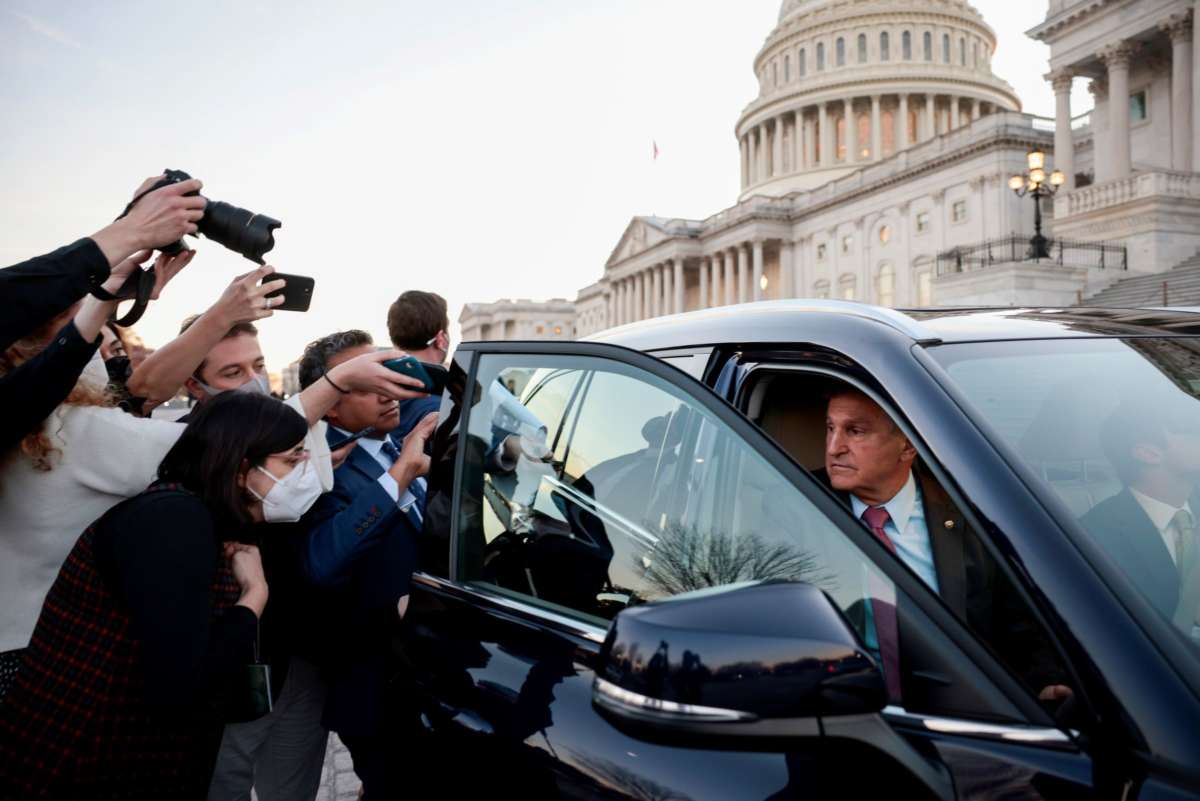After announcing his opposition to Democrats’ Build Back Better Act, Sen. Joe Manchin (D-West Virginia) explained in an interview on Monday that he never planned on compromising with fellow Democrats to support crucial portions of the bill – and that he preferred instead to essentially axe the bill altogether.
On West Virginia MetroNews’s “Talkline with Hoppy Kercheval,” Manchin said that he has “been way far apart philosophically” from fellow Democrats who pushed to lower the price of prescription drugs and provide financial assistance to families via the expanded child tax credit and other potentially transformative proposals.
Though he claims to have supported tax reforms and prescription drug proposals, Manchin said that in the end, it was a personal conflict with White House staff that pushed him to kill the legislation, which could have helped reduce poverty and set the country on track to finally address the climate crisis. But he refused to say why he killed the bill, continuing his months-long pattern of obfuscating his motivations, despite his position as a powerful public official.
Instead, Manchin pinned the responsibility for the bill’s demise on the White House. “They know the real reason what happened. They won’t tell you and I’m not going to,” he said. “It’s not the president, it’s the staff. And they drove some things and they put some things out that were absolutely inexcusable and they know what it is and that’s it.”
The conservative lawmaker went on to criticize his fellow Democrats for trying to gain his favor on the bill, suggesting that protesters who confronted him over his opposition were working to change his mind on behalf of the Democratic Party.
“I knew where they were and I knew what they could and could not do. They just never realized it because they figured, surely to God we can move one person, surely we can badger and beat one person up, surely we can get enough protesters to make that person uncomfortable enough,” he said.
“Well, guess what? I’m from West Virginia. I’m not from where they’re from, and they can just beat the living crap out of people and think they’ll be submissive, period,” he continued, dismissing the fact that some of the protesters he faced are from West Virginia. He has also brushed over polling that has found that a majority of likely voters in his state support the bill, including 90 percent of West Virginia Democrats.
As a workaround to his own opposition, Manchin said that the Senate should break up the bill and work it through committees instead – despite knowing full well that almost none of the bill’s provisions would pass the 60-vote filibuster threshold.
Though Manchin didn’t say much about the contents of the bill during the interview, he did take particular issue with the child tax credit expansion, which has contributed to a sharp reduction in child poverty since it was implemented last year. The lawmaker suggested that people making between $200,000 and $400,000 shouldn’t be receiving the tax credit, ignoring that the income cap for single earners for the tax credit is $240,000, with people making above $75,000 receiving smaller amounts.
Supporters of the Build Back Better Act have expressed frustration that Manchin is killing the bill while also refusing to be held accountable for the reasons why.
On Monday, Rep. Alexandria Ocasio-Cortez (D-New York) pointed out that progressives have been saying for months that Manchin was never going to support the bill unless Democrats had leverage over him, likely in the form of the bipartisan infrastructure bill.
“When we suggested this months ago, people were outraged, accused us of insulting people’s character, called us disruptive, etc.” Ocasio-Cortez wrote. “Capitol Hill is full of folks who convince themselves they’re three steps ahead by rationalizing to themselves why the obvious isn’t true.” She then called on President Joe Biden to use his executive authority to take action on measures that Congress won’t address.
Manchin said during the interview that he reached his “wit’s end” on the bill – but regardless of how fed up Manchin is with negotiations, the public, especially the lower- and middle-income people that the bill would help, are quickly approaching potential crises.
The end of expanded child tax credits would also mean the end of its poverty-reducing effects, economists warn. Meanwhile, student loan payments are scheduled to restart at the beginning of February. “Working families could lose thousands of $/mo just as prices are rising,” Ocasio-Cortez pointed out on Twitter.
Media that fights fascism
Truthout is funded almost entirely by readers — that’s why we can speak truth to power and cut against the mainstream narrative. But independent journalists at Truthout face mounting political repression under Trump.
We rely on your support to survive McCarthyist censorship. Please make a tax-deductible one-time or monthly donation.
